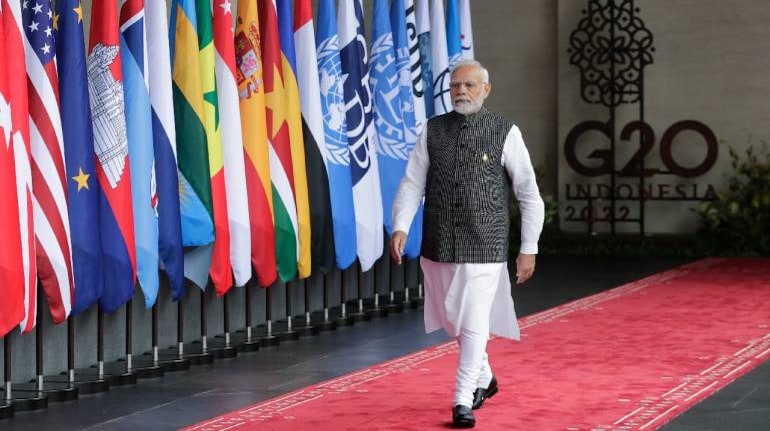



It once seemed hyperbolic to say that the world is confronting a confluence of unprecedented threats. Today, this is widely accepted as a matter of fact. From Climate Change and the pandemic, to war and a looming recession, major forces are upending life as we know it. Former United States Treasury Secretary Lawrence Summers, one of the founders of the Group of 20 nations (G20), recently noted: “[T]his is the most complex, disparate, and cross cutting set of challenges that I can remember in the 40 years I’ve been paying attention to such things.” This is the backdrop for India’s G20 presidency.
Much has been said about why India’s leadership of the G20 is important. It is the world’s largest democracy, and a key economic and geopolitical player on the global stage, and so what India puts on the agenda matters. But perhaps most importantly, India has an opportunity to be a flag-bearer for the Global South. It can cast a spotlight on economic issues that matter most to the greatest number of the world’s people. So India must push the G20 to take pre-emptive action, rather than just react, by prioritising two key challenges confronting much of the Global South.
First, the growing debt-burdens of several developing and emerging market economies constitute a looming crisis, and must be addressed as a matter of priority. High debt-burdens curtail a country’s ability to act. Several low-income and emerging market economies were experiencing debt distress, or were at high risk of it, even before the pandemic. With the onset of the COVID-19 crisis, the ensuing high inflation, and a strong dollar that makes repayments punishingly expensive, the debt crisis is building.
The Debt Service Suspension Initiative and the G20 Common Framework have proved insufficient, and unpopular. It is evident that short-term delays in scheduled repayments are not enough. Current instruments are inadequate to deal with a diverse creditor landscape. There is a need for the G20 to take pre-emptive action that helps countries deal with debt distress, permanently restructure their debt, and to improve debt architectures including instituting greater debt transparency.
Second, many developing countries, including those in the G20, have large and growing youth populations, but they lack enough productive employment. Moreover, labour market disruptions like Climate Change, the energy transition, and technological shifts are making matters worse. In the face of this churn, social safety nets are even more important, not just to protect workers, but to actually enable them to undertake transitions from one sector to another; from one geography to another. In addition to the efforts to prioritise job creation, unless there are strong safety nets and adequate social assistance initiatives, the accelerating frequency of economic shocks will be a source of instability. A lack of social security will undermine the political and economic viability of imperative transitions.
To tackle these unprecedented challenges, the discourse on international collaboration has to go beyond technology transfers and funds to compensate for Climate Change-induced loss and damage. The G20 must explore ways of supporting the development of social welfare institutions in developing countries. Not only is there a need to make good on financial commitments to support a just transition, but funds for adaptation must be flexible enough to be applied to the development of social welfare systems.
The international multilateral institutions involved in economic governance must be made more effective and attuned to the realities of the Global South. The G20 should lead the effort including with the International Labour Organization and the World Bank to provide guidance on which welfare entitlements should be prioritised based on available fiscal space, and what combination of contributions, insurance premiums, tax revenues, and other sources of finance could support the provision of social security entitlements.
The G20 was born in 1999 out of the Asian financial crisis, but it was arguably at its best when its members agreed to co-ordinate the timing of their fiscal stimulus packages to stabilise the global economy after the onset of the 2008 financial crisis. More recently, however, the multilateral forum has waned in its efficacy. Addressing the looming debt crisis and mobilising financial and technical support to build effective social security systems will help developing countries get back on their feet and become more resilient.
India has an opportunity to prioritise these issues toward reinstating the effectiveness of the G20, and in doing so it will underscore its own place in the world. Let us hope that when we confront our biggest challenges, we can rise to our best, and that India can provide the leadership for this.
Sabina Dewan is President and Executive Director, JustJobs Network, and Senior Visiting Fellow, Centre for Policy Research. Views are personal, and do not represent the stand of this publication.
Discover the latest Business News, Sensex, and Nifty updates. Obtain Personal Finance insights, tax queries, and expert opinions on Moneycontrol or download the Moneycontrol App to stay updated!
Find the best of Al News in one place, specially curated for you every weekend.
Stay on top of the latest tech trends and biggest startup news.